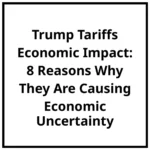Discover how Microsoft stands resilient amid tech tariffs impacting the global market. We explore five key reasons behind its strength and future outlook.

In today’s rapidly shifting economic landscape, tariffs have become an integral part of discussions surrounding the tech industry. As many companies grapple with the challenges imposed by these levies, Microsoft emerges as a remarkable case of resilience. But what exactly makes Microsoft navigate these turbulent waters more effectively than its competitors? In this article, we explore the factors contributing to Microsoft’s resilience in tech tariffs.
Read Also – 👉👉Wayfair Spring Cyber Week Sale 2024: Unbelievable Discounts Up to 88% Await!👈👈
Understanding Tech Tariffs and Their Impact
What Are Tariffs and Why Do They Matter?
Tariffs, essentially taxes imposed on imported goods, have far-reaching consequences across various industries, especially technology. When governments announce tariffs, businesses are forced to adjust their budgets, often leading to increased costs for manufacturing tech products. This is crucial because the technology sector heavily relies on foreign parts and components. The inflation in costs can drive up prices for consumers and induce uncertainty in financial markets. Overall, tariffs can strain a company’s financial health, affecting profits and stock performance dramatically.
The Broader Economic Context
In the grand scheme of things, tariffs are not just tax tools; they represent a country’s economic strategy—often politicized and complex. For tech companies, this is particularly delicate. Tech firms depend on global supply chains for various components, and any disruption can ripple across their operations. For instance, increased operational costs directly compromise profitability, compelling companies to reassess their strategies. As a result, unfamiliar waters mark the current landscape, with investors watching how different tech giants will cope with these challenges.
Microsoft’s Strategic Edge in Challenging Times
Key Factors for Microsoft’s Resilience
- Diverse Revenue Streams: Microsoft benefits from a wide array of products, from Office software to cloud services.
- Strong Cloud Presence: Azure’s projected growth revenue reflects Microsoft’s market strength in cloud computing.
- AI Investment: Microsoft’s commitment to AI technologies sets the stage for future revenue growth and operational efficiency.
- Solid Cash Flow: Positive cash flow positions Microsoft favorably, allowing them to invest strategically.
- Positive Analyst Sentiment: Analysts remain optimistic about Microsoft’s growth, asserting confidence in its stock performance.
Analysts and Market Sentiments: The Outlook on Microsoft
Bullish Projections Amidst Volatility
Despite the recent volatility in the stock market fueled by tariff concerns, analysts maintain a generally positive outlook on Microsoft’s stock. Price targets ranging from $450 to $575 suggest confidence in its long-term sustainability. Expert opinions emphasize factors like strong cash flow and innovation as pillars that will support Microsoft’s growth trajectory. Consequently, while tariffs may create hurdles, many experts believe that Microsoft’s strategic maneuvers will keep it ahead of the curve in the tech landscape.
Navigating Industry-Wide Challenges
Even though Microsoft exhibits resilience, the broader tech industry isn’t unaffected by tariff-induced challenges. Increased costs and disrupted supply chains may afflict many tech companies, yet Microsoft seems to be better prepared for these potential pitfalls. Analysts point out that Microsoft’s diversified operations and focus on innovation mean it can manage price hikes and maintain a competitive stance against rivals. In a world of uncertainty, investor confidence in Microsoft serves as a hopeful message amidst the negativity.
Looking Ahead: Future Prospects for Microsoft
Long-Term Growth Initiatives
- Continued AI Advancements: Microsoft aims to capitalize on AI’s potential across all platforms, enhancing efficiencies.
- Cloud Dominance: Ongoing investments in Azure solidify Microsoft’s leading position in the cloud market.
- Regulatory Adaptation: Proactive strategies may mitigate any regulatory challenges on the horizon.
- Market Adaptability: Microsoft’s ability to adapt to changing market conditions will be key to its continued success.
- Focus on Innovation: Sustained emphasis on developing new technologies keeps Microsoft competitive.
Conclusion
Microsoft’s resilience in tech tariffs showcases its strong market positioning and innovative spirit. Faced with hurdles posed by tariffs, the company has leveraged its diverse portfolio, robust cloud services, and commitment to AI to maintain a competitive edge. While challenges from competition and regulatory concerns remain, the outlook for Microsoft remains bright, thanks to its strategic resilience and calculated investments. As the landscape continues to evolve, Microsoft stands prepared to adapt and thrive.
FAQs About Microsoft’s Resilience in Tech Tariffs
What role does Azure play in Microsoft’s resilience against tariffs?
Azure plays a pivotal role in Microsoft’s resilience against tariffs by serving as a significant revenue booster. As businesses increasingly migrate to the cloud, Azure’s projected growth of 32-34% year-over-year is a crucial buffer against economic volatility. With enhanced AI capabilities integrated into its services, Azure supports various enterprises in optimizing operations and costs, which can counterbalance the adverse effects of tariffs on pricing dynamics.
How do tariffs affect the technology sector overall?
Tariffs broadly impact the technology sector by increasing the cost of imported components, which often leads to a rise in consumer prices. The tech industry is heavily reliant on global supply chains, and any disruption from tariffs can cause inefficiencies and delays in production. Companies may face squeezed profit margins as they navigate these increased costs, potentially affecting stock performance and investor sentiment in highly competitive tech landscapes. Tariffs create a complex interplay that necessitates strategic maneuvering by tech firms to maintain stability.
Related Videos
Read Also –
The information contained in this article is meant for informational purposes only and should not be construed as financial advice. Investors should conduct their own research or consult a financial advisor before making investment decisions.
Read Also –
| https://ground.news/article/tariffs-are-tanking-tech-stocks-so-why-is-microsoft-escaping-the-worst-of-the-bloodbath |
| https://techhub.social/@Techmeme/114282003464542126 |
Hey! I hope you enjoyed reading this! If you did, could you do me a small favor and hit the like button? It would mean a lot to me and help me reach more people. Thank you so much! Got any thoughts on this post? Drop them in the comments below!
How many stars would you give for my effort?





